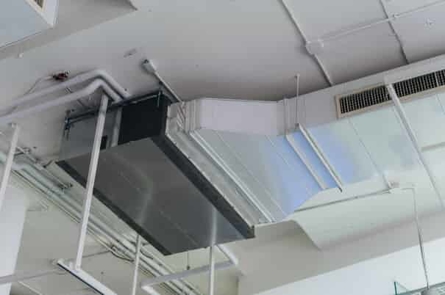The extreme climate in Phoenix presents unique challenges for commercial HVAC systems. With summer temperatures exceeding 110°F and sudden humidity spikes during the monsoon season, moisture accumulation within ductwork can create the perfect environment for mold growth. Businesses in high-traffic areas such as Downtown Phoenix, the Scottsdale Road Corridor, and near Sky Harbor Airport frequently encounter mold issues in their HVAC systems, despite the region’s arid reputation. Unchecked mold growth in commercial HVAC ducts can lead to serious problems, including health risks for employees and customers, as well as damage to a business’s reputation. Understanding how to identify and prevent mold in HVAC systems is essential for maintaining a healthy work environment and ensuring efficient system performance.
Why Phoenix Commercial Buildings Face Unique HVAC Mold Risks
Monsoon Season Impact - Phoenix’s monsoon season, which runs from July through September, brings sudden surges in humidity. These rapid changes create condensation within HVAC systems, particularly in cooling ducts, where moisture can accumulate and foster mold growth.
Temperature Extremes - With temperature fluctuations often exceeding 30°F between day and night, Phoenix’s HVAC systems experience significant stress. This constant shift can lead to condensation inside ductwork, providing an ideal breeding ground for mold.
Desert Dust - Phoenix’s notorious dust storms introduce organic material into HVAC systems. When this dust combines with moisture, it can serve as a food source for mold, accelerating growth and spreading spores throughout the building.
System Overwork - Commercial HVAC systems in Phoenix run almost continuously during the summer months to maintain indoor comfort. The constant operation can lead to excessive moisture accumulation in ductwork, particularly if drain lines and cooling coils are not properly maintained.
Identifying Mold in HVAC Ducts: Key Warning Signs
Visual Indicators - Routine maintenance inspections should include checking for visible signs of mold growth within accessible ductwork and around air vents. Look for dark spots, discoloration, or fuzzy patches on duct surfaces.
Air Quality Complaints - Employees experiencing persistent allergy symptoms, headaches, eye irritation, or respiratory issues may be reacting to mold spores circulating through the HVAC system. Frequent complaints from staff about these issues should prompt an inspection.
Efficiency Changes - Mold buildup inside ductwork can restrict airflow, leading to reduced HVAC efficiency. If energy bills increase or cooling performance declines, mold contamination could be a contributing factor.
Musty Odors - Mold often produces a distinct, musty smell. In Arizona’s dry climate, these odors might not be as intense as in more humid regions, but a persistent earthy or stale smell near vents can signal mold presence.
Preventative Maintenance for Phoenix Commercial HVAC Systems
Scheduled Inspections - Regular HVAC maintenance is crucial for preventing mold growth. Commercial buildings in Phoenix should schedule professional inspections at least twice a year—before the peak summer season and after the monsoon season—to catch potential issues early.
Humidity Control - Maintaining optimal indoor humidity levels can help prevent mold growth. During monsoon season, dehumidifiers or moisture control settings should be adjusted to keep humidity levels below 60%.
Filtration Upgrades - Investing in high-quality air filters can help trap mold spores and desert dust before they enter ductwork. HEPA filters or MERV-rated filters suited for commercial HVAC systems in dusty environments are recommended.
Condensate System Maintenance - Phoenix’s hard water conditions can lead to mineral buildup in condensate drain lines, increasing the risk of blockages. Ensuring that drain lines are clear and functional prevents standing water, which can contribute to mold growth.
When to Call Commercial Mold Remediation Experts
Visible Spread - If mold is visibly spreading beyond a small, localized area, professional remediation is necessary to prevent further contamination and structural damage.
Recurring Issues - Persistent mold problems may indicate underlying HVAC design flaws or improper moisture control. Professional assessments can identify and address these root causes.
Indoor Air Quality Concerns - If employees or customers report ongoing health issues related to air quality, a professional mold inspection and air quality test should be conducted to determine the extent of the problem.
Regulatory Compliance - Arizona commercial buildings must comply with air quality and mold remediation standards. Failing to address HVAC mold issues can result in regulatory fines and liability concerns.
How ServiceMaster All Care Restoration - Phoenix Addresses Commercial HVAC Mold
Comprehensive Assessment - ServiceMaster All Care Restoration - Phoenix specializes in identifying mold issues in commercial HVAC systems. Their assessments include air quality testing and moisture level analysis tailored to Arizona’s unique climate challenges.
Advanced Remediation Technology - Utilizing state-of-the-art equipment, including HEPA vacuums, antimicrobial treatments, and UV light technology, their team effectively removes mold from ductwork while preventing future contamination.
Business Continuity Focus - Understanding the importance of uninterrupted operations, ServiceMaster All Care Restoration - Phoenix offers remediation solutions designed to minimize downtime. Their team works efficiently to restore air quality without major disruptions to business activities.
Phoenix-Specific Expertise - With extensive experience handling HVAC mold issues in the Valley, their professionals understand the local climate’s impact on commercial HVAC systems. They offer customized solutions to ensure long-term mold prevention.
Mold in HVAC ducts can threaten both employee health and business operations, making early detection and prevention critical. While routine maintenance and air quality control help reduce risks, Phoenix’s unique climate often necessitates professional remediation to fully resolve mold issues. If your business suspects mold contamination in its HVAC system, don’t wait for the problem to worsen. Contact ServiceMaster All Care Restoration - Phoenix today for a professional assessment and expert mold remediation tailored to the demands of Arizona’s climate.


